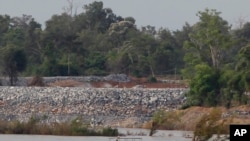High-ranking Laos officials said on Wednesday that the proposed Pak Beng hydropower dam will not have a major impact on downstream communities, claiming that they would take time to study its potential impacts.
Pak Beng, a $2.3 billion dam some 1,500 kilometers from the Cambodia border, will be the third dam the country has constructed on the mainstream Mekong river if it is built.
The project is expected to get the go-ahead and be completed by 2024.
Laos’ two other controversial Mekong projects, the Xayaburi and Don Sahong, have become a major concern for environmentalists and downstream communities who rely on the river ecosystem.
At a two-day regional stakeholder meeting this week, organized by the Mekong River Commission, the country’s minister of natural resources and environment, Sommad Pholsena, said it would be difficult to reach “absolute agreement” on the dam.
“I am also like you. I am responsible for natural resources and environment.
I would like to leave a good environment for our next generation,” he said.
“The MRC members have the responsibility for the people of Laos, Thailand, Vietnam and Cambodia, and it is the duty of the Laos government, especially the ministry, to give importance to their [concerns],” the minister told reporters.
Daovong Phonekeo, the permanent secretary of Laos’ Ministry of Energy, told VOA Khmer that the dam will not have a major impact on the lower Mekong river countries.
“And Pak Beng is upstream from the Xayaburi. We will follow the same standards, the same requirements. So I believe that this is less of a concern for the Pak Beng,” he said.
When asked if Laos will continue to build more dams, Daovong said, “Yes, yes, of course. It depends on cost-benefit and the economics of the project. If the project is financially, economically and environmentally valuable, then why should it not be developed? That is the easy principle.”
Daovong added that Laos would also consider solar and wind energy if the cost was cheaper than hydropower dams.
Prior to the meeting, Cambodian environmental groups asked the government to reject the project, alarmed by the potential impacts on fisheries and sediment flow in the Mekong.
It is expected that 25 villages in Laos and two villages in Thailand will be directly affected by construction of the Pak Beng dam, with an estimated 6,700 people re-settled, according to International Rivers.
Nuanlaor Wongpinnitwarodom, the director of the Bureau of Mekong Management of the Thai National Mekong River Committee, told VOA Khmer that the Thai government will do more studies following concerns raised by villagers in Chiang Rai province.
“From the Thai side, people are worried about that. We will do more scientific surveys. We did not know the impacts yet,” she said.
Laos contributes 41 percent of the flow into the Mekong River, more than any other country. Laos, the only landlocked country in Southeast Asia, plans to develop more dams to profit from electricity exports.








